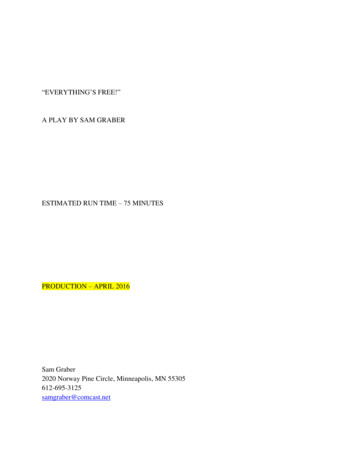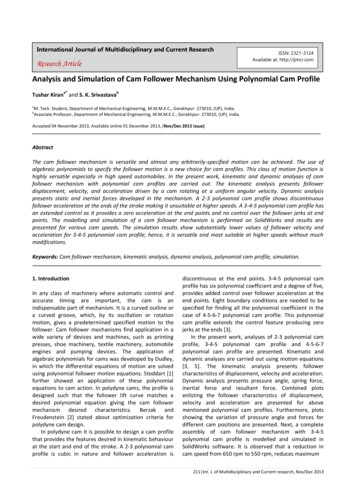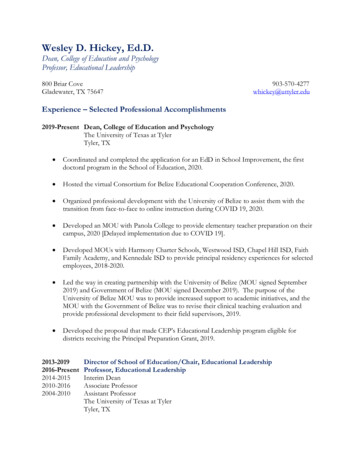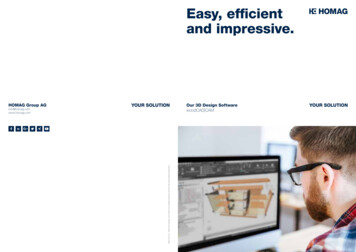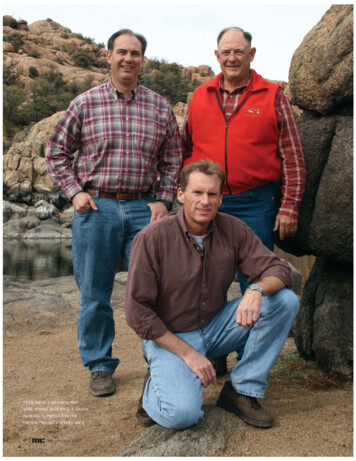
Transcription
TYLER SMITH, CAM SMITH ANDMARK BOEHLE ANTICIPATE A STEADYINCREASE IN POPULATION FORYAVAPAI PRECAST’S SERVICE AREA.40M a y /J u n e 2 0 0 7
An Arizona precasteris forecasting a brightfuture as area growthcontinues to rise.desertdestinationBy Ron HyinkPhotos by Mark BoehleDespite the recent buzz in the news media aboutglobal warming, Arizona – known for its hot, aridclimate – is the place to be. The state’s populationgrowth rate, according to the latest census reports,is tops in the nation.That’s OK with Campbell and Tyler Smith ofYavapai Precast in Prescott, because it means theirwastewater and stormwater products business willbe plenty busy for a long time to come. As morepeople pour into the state and establish residencesoutside city limits, they’ll be needing the Smiths’septic tanks, and once the cities annex the newsubdivisions, they’ll then need the stormwaterinfrastructure. For the Smiths and Yavapai Precast,it’s a win-win situation.Suburban sprawlUntil the past few years, thedesert Southwest had largely beenignored as a place to make a homefor whatever reasons, but now it isdefinitely in vogue. Perhaps theattraction is the aridness itself,which is noted to be good therapyfor people with respiratoryproblems, or perhaps it’s the wideopen spaces that allow people tobreathe a little easier. Whatever the reason, at 3.6percent growth, Arizona has elbowed its way pastNevada (at 3.5 percent) as the No. 1 growth area inthe United States.As of July last year, according to the U.S.Census Bureau, Arizona surpassed 6 million inpopulation, up more than 213,000 from theprevious year. That equates to nearly 600 newsouls every day. Granted, the southern part of thestate – primarily the Phoenix and Tucson areas –is taking in most of the growth, but YavapaiPrecast’s area of coverage in the northern part ofthe state is getting its share.“In Arizona and the other Western states, wehave a lot of miles between communities,” saidCampbell, or Cam as he is called,president and majority owner ofYavapai Precast. “It’s not likeback East,” he said, where thepopulation is much denser andprecasters are located withinrelatively close proximitycompared with northern Arizona.“We’re not set up that way. Wehave a town that we operate outof over an area, and we covergreat distances, because there’sM a y /J u n e 2 0 0 741
guess we’ve been blessed.”It’s a situation that offers more growth potential to YavapaiCounty and puts Yavapai Precast in the center of that growth.For example, Prescott Valley, a relatively new town just to theeast of Prescott, is attracting new growth, as is Chino Valleyto the north.Confined quartersTHE ULTIMATE DESTINATION FOR MANY A YAVAPAIPRECAST SEPTIC TANK IS IN A REMOTE LOCATION.nothing in between.” He added that the surrounding statesare hundreds of miles away and too far for him to serviceregularly, but there is plenty of market share within Arizona’sborders.“It’s a big state,” said Tyler, general manager and minorityowner. “We’re sitting pretty much in the middle of it.” Tylerexplained that Prescott, the largest city in Yavapai County, issurrounded by private land, which has enabled area growth.Flagstaff, a city two hours to the northeast, is surrounded bynational forest. “So it’s got finite growth.” Payson, to thesoutheast, is in a similar situation. “Payson has the MogollonRim on one side but national forest everywhere else, so it hasa heck of a time growing also. So from that standpoint ITHE YAVAPAI PRECAST YARD CONSISTS OFMULTIPLE TIERS ALONGSIDE A HILL.42M a y /J u n e 2 0 0 7Like the cities in Arizona, Yavapai Precast and its sisterdivision, Yavapai Block, are bursting at the seams and in needof more space. Even with no production facility – all precastproduction operations occur under open sky – YavapaiPrecast has no room left to grow. The combined yard andproduction area, which is situated on a multi-tiered hillside, islong and narrow, and limited numbers of product can bestacked on one of the tiers until it can be delivered tocustomers.As if that were not enough of a challenge, the batch plant– also outside – sits on leased land belonging to a localNative American tribe, who wants the property back. “We’regoing to move our batch plant down there,” said MarkBoehle, sales manager, pointing to an empty spot at theopposite end of the property. “We’re just waiting for thebuilding permit.” Although the move may have been made by
the smithodysseythe time this ispublished,production willcontinue to take placeCampbell “Cam” Smith, president and majority owner of Yavapai Precast inoutside – at leastPrescott, Ariz., described his father, Richard H. “Dick” Smith, as having alwaysuntil the company canbeen filled with entrepreneurial spirit. And really, what other type ofmove to a newpersonality could have made its way onto a box of Wheaties? “My dad waslocationwith morean All-American at the University of Minnesota, and those were the gloryacreage.That’s also indays for Minnesota,” said Cam. “They were national champs, they never losttheplansfor thea game during those years. And he got his picture on the Wheaties box.”company’sfuture.But going from collegiate stardom in Minnesota to manufacturing precastFor the time being,concrete in Arizona took the Smiths on a circuitous route. Both Cam and his fatherhowever, things will proceed as theywere born in Illinois, but when Cam was very young his father moved the family toalways have, although working outsideCalifornia. “We stayed out there during the war years,” said Cam.has not been so much of an issue asDick then moved them to Utah for a short while, and then it was back to Illinois forone might think. Prescott is at thethree years to help run a car dealership. But something had come over his parents, andthat was an overwhelming desire to go back West. “Once you’ve been out West and the5,300-foot level, which gives the areaclimate grows on you, it’s very difficult to go back to the humidity and cold weather,” saidsome relief from the stereotypical hotCam. “So then they came looking.”Arizona climate. “It doesn’t get that hotIn his search for a place to finally settle down, Dick Smith had narrowed his options tohere,” said Mark. “It’s a real goodjust a few places, including Prescott, whose downtown area was modeled after theclimate.” Rain is rare, but winters docourthouse and town square configurations that are so prevalent in the Midwestern states.get some precipitation. “We get a little“I think my dad and mother are typical of what could have taken place with most peoplebit of snow. We definitely get thewho moved here,” said Cam. “It’s a fantastic climate – you’ve got the four seasons. Theyseasons,” he said.didn’t move here for health reasons, but they moved here from a climate standpoint.”When it does rain or temperaturesDick started business in Prescott by purchasing a sports store. He eventually sold that andbecome unbearably cold or hot, workerswent into business with a partner in a bowling alley. He sold his share in that and got intocan knock off, although it doesn’tthe lumber business with another partner. “Then we got into the block business,” saidhappen all that often. Glenn Ross,Cam. That was in 1966. “So it was block and lumber and concrete.” Cam’s father finallyproduction manager, and his crew takesold the lumber yard, and then Cam bought the block plant and a ready-mix operation init in stride. “I think it’s great! You get a1978, as well as the precast operation manufacturing septic tanks, but Cam later sold thesun tan in the summer,” he quipped.ready-mixed business.“Sometimes we get temperatures as lowCam and son Tyler, general manager and minority owner, now have their eyes firmlyas zero, but those are days youfixed on the future. Company growth has done well over the years, and they are lookingprimarily don’t do a whole lot. Wefor new real estate on which to expand the business. “So we’ll have a nice store, we’llmight get a bunch of stuff stripped andhave plenty of acreage for precast, we’ll have plenty of acreage for the block plant,” saidpartly set up for the next day.”Cam. “We’ll have plenty of room to grow and do anything we want to looking out at leastTyler is hoping for a building once20 years from now.”the company moves to more spaciousenvirons. “We’re looking for a biggerpiece of land right now, something flat,” he said. “We’resitting on 17 acres here, believe it or not, but we’d like to geton a nice 30- to 40-acre piece.”The Smiths already have a place in mind and are innegotiations to acquire it. “The new plant will actually give ussome flexibility,” said Cam, because in another five to 10years it will be in the midst of the surrounding communitiesand their expected growth patterns. “Prescott will annexanother 11,000 acres in this area, probably another 4,000acres with Chino, and another 4,000 acres with PrescottValley,” added Cam. “So it puts that property right at theapex, because we believe in bringing the retail business tothe customer.”44M a y /J u n e 2 0 0 7
Doing businessRetail sales is another thing that sets Yavapai Precast apartfrom most other precasters. “We sell on a direct basis toeverybody,” said Cam, adding that it opens up the entire46M a y /J u n e 2 0 0 7product line to directbuy. “And thecustomers like thatvery well.”The company doeshave its contractorpricing, of course, andmost of its business is contractor-focused, as the contractorsresell and install the precast products. And because YavapaiPrecast does not do the installations, it results in a goodworking relationship. “We should not in any way be incompetition with the people we sell to,” said Cam. “Weshould be driven by customer service and quality, and not bein competition with anybody that installs our product. Thesame thing in the masonry business that we’re in – we willnever have a masonry license.”The real competition comes from manufacturers of othermaterials – and from careless installers from which thoseother manufacturers can draw a trump card in the competitiongame. For example, Cam and Tyler explained that oneinexperienced installer used no sealants of any kind on a twopiece precast septic tank installation. The resulting leaks
helped feed the falseperception that twopiece precast tanksare less reliable thanthe one-piece tanksoffered by thecompetition. But rather than fighting the negative perception,the Smiths have deemed it more advantageous to swap outtheir two-piece tank molds for one-piece molds.“That was a tough decision for us. It’s costing about aquarter of a million to replace the molds,” said Tyler. “Everytwo-piece tank is just as good as the one-piece if installedproperly in the field. However, the perception has hurtenough in our area of Arizona to warrant us having to makethe change to the one-piece tank.”Cam added that they are interested in staying ahead ofstate regulations, which could very likely start enforcing aone-piece design with little advance notification.Adapt or die. It’s a part of the Smiths’ strategic planning.One-piece septic tanks, retail sales and a larger piece ofproperty on which to build will set Yavapai Precast on theroad to a successful future.ALL OF YAVAPAI PRECAST’SPRODUCTION HAPPENSUNDER THE SUN.Smoother Surfaces andFlexible Design Is your precast item showing signs of cracking notattributed to expected mechanical setting problems? Is your precast item growing in length unexpectedly? Are the cracks growing? Are you experiencing popouts that you cannot explain?If so, you may be experiencing ASR (Alkali Silica Reactivity),a reaction that occurs in concrete between reactive portionsof your aggregates and/or sand and alkali from yourcement or external sources.FMC is the leader in lithium technologies for the prevention and mitigation of ASR.FMC’s Lifetime admixtures mean Using locally available raw materials in cost-effective ways Smoother surfaces Decrease in dangerous temperature peaks during curing by acting as a fluxPatented Renew concrete treatment allows The treatment and salvage of ASR-affected precast products,thus reducing rework.Visit http://fmclithium.com for more information or call 1-888-lithium.Our logos mean reliable state-of-the-art ASR technologies.48M a y /J u n e 2 0 0 7
That's OK with Campbell and Tyler Smith of Yavapai Precast in Prescott, because it means their wastewater and stormwater products business will be plenty busy for a long time to come. As more people pour into the state and establish residences outside city limits, they'll be needing the Smiths' septic tanks, and once the cities annex the new

